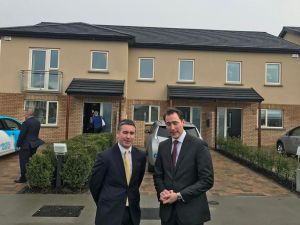Participants in the Back to Work Enterprise Allowance (BTWEA) are twice as likely to be in full employment after six months than those who did not take part, a review has found.
The study compared people who had stayed on the BTWEA scheme for its full two year duration with non-participants.
Minister for Housing and Urban Renewal, Damien English T.D. said the review, published by Minister for Social Protection Leo Varadkar, was very encouraging for Meath West.
“In Meath, some 475 people are currently participating in the programme, while in Westmeath the figure is 235 people.
“Entrepreneurs are vital for local economies, our economic future and for job creation.
“I would encourage anyone who is currently unemployed in Meath and Westmeath to use this valuable State support which helps starting a new business.
“This review has shown the allowance is highly effective in getting people in Meath and Westmeath from welfare to work” the Meath West Fine Gael T.D. and Minister said.
The BTWEA helps people who are unemployed or claiming welfare to set up their own business and continue receiving State income supports for two years, while getting advice and support for running a new enterprise.
Minister English continued: “The Department of Social Protection has also made it much easier for many more people to avail of the allowance.
“The qualification period has been reduced from 12 months to just nine months for more people on welfare, not just for Jobseekers, but also reduced those on other schemes like One-Parent Family Payment, Jobseekers Transitional Payment, Disability Allowance, and Farm Assist, and other welfare payments.”
ENDS
Geographic breakdown of BTWEA participants by county:
| County | Number Participants | Percentage of Live Register for County |
| CARLOW | 194 | 8.7% |
| CAVAN | 275 | 11.1% |
| CLARE | 412 | 12.4% |
| CORK | 770 | 6.2% |
| DONEGAL | 413 | 6.0% |
| DUBLIN | 2833 | 8.0% |
| GALWAY | 612 | 8.9% |
| KERRY | 390 | 9.3% |
| KILDARE | 425 | 7.3% |
| KILKENNY | 297 | 11.8% |
| LAOIS | 220 | 6.9% |
| LEITRIM | 130 | 12.4% |
| LONGFORD | 160 | 8.2% |
| LOUTH | 509 | 9.1% |
| MAYO | 384 | 9.3% |
| MEATH | 475 | 14.0% |
| MONAGHAN | 162 | 8.8% |
| OFFALY | 198 | 5.7% |
| ROSCOMMON | 158 | 11.3% |
| SLIGO | 194 | 10.6% |
| TIPPERARY | 406 | 7.3% |
| WATERFORD | 375 | 8.2% |
| WESTMEATH | 235 | 5.9% |
| WEXFORD | 369 | 5.5% |
| WICKLOW | 546 | 12.9% |
| Total Participants and national Percentage |
11548 |
8.2% |






